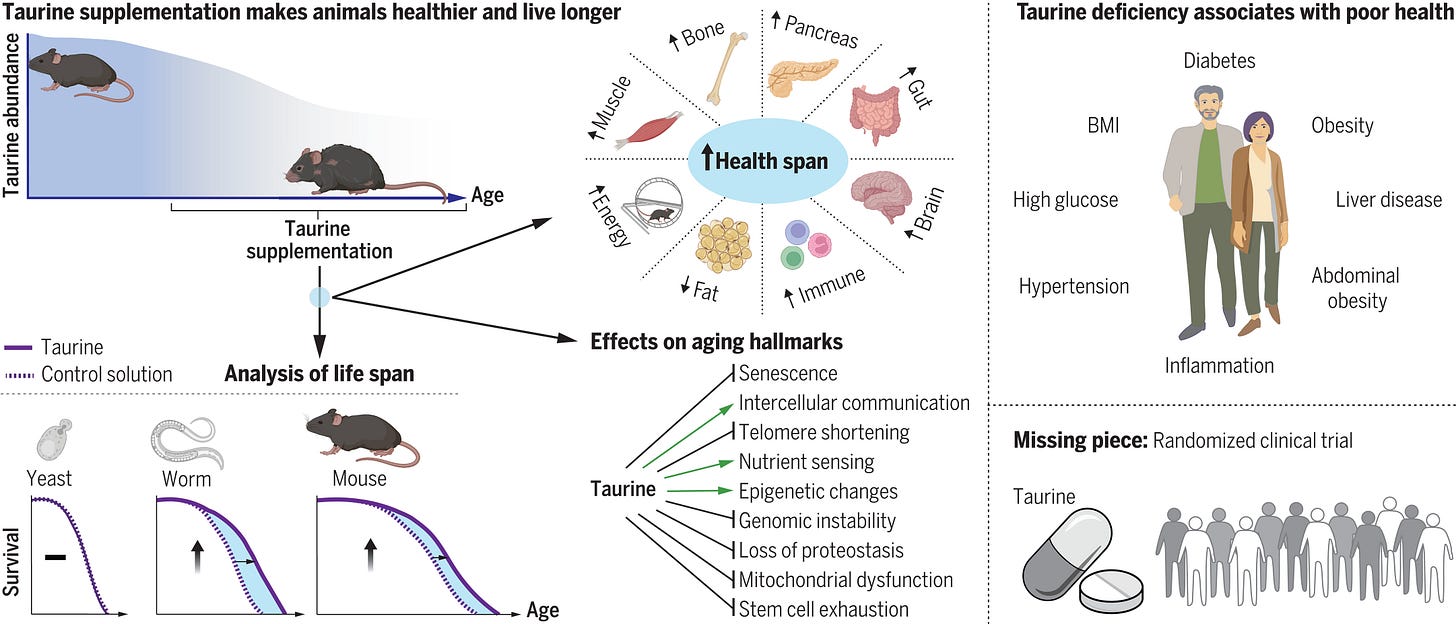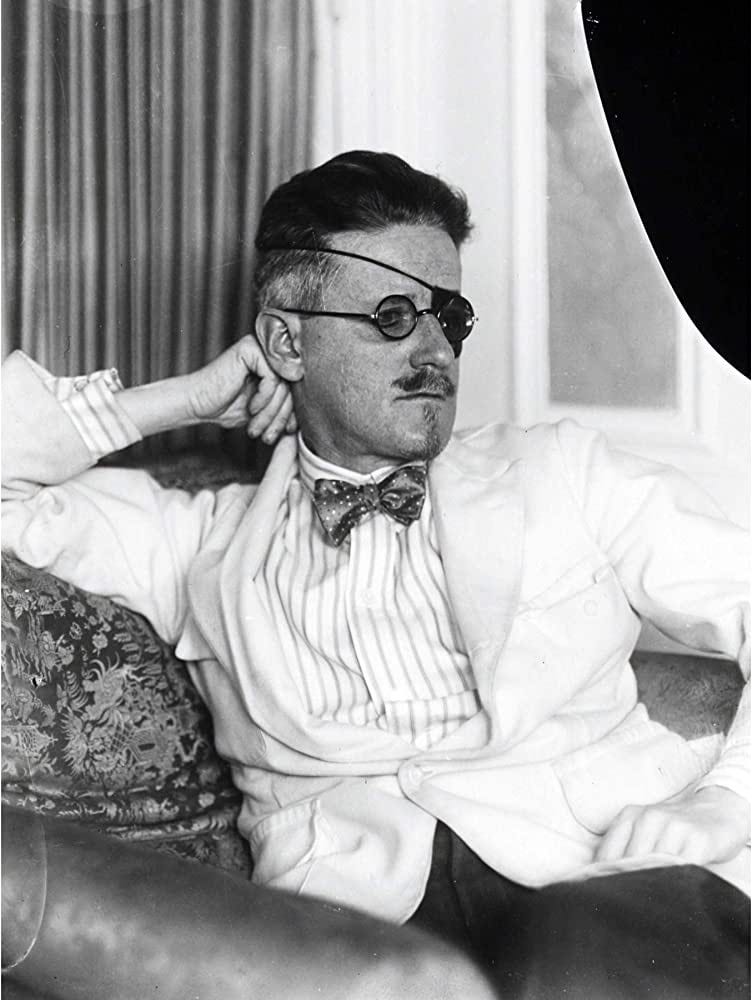Energy drinks extend your life, McCarthy passes, book reveal, social media sociopathy
Desiderata #13: links and commentary
The Desiderata series is a monthly roundup of links and thoughts, as well as an open thread and ongoing AMA in the comments for paid subscribers (along with extra links).
1 of 13. Since the last Desiderata, The Intrinsic Perspective published:
The mind-body problem was discovered by a princess: Philosophical letters from a possible Renaissance romance
The White House agrees you have a small brain: Human extinction and AI denial
Stop trying to make a "good" social media site: You want what cannot be had
(🔒 comments) The UFO craze was created by government nepotism and incompetent journalism: Blame Harry Reid, Skinwalker Ranch, "dino-beavers," and The New York Times
(🔒) AI writing is proliferating in major media organizations: The Guardian now says it will use AI-generated text
2 of 13. A recent paper in Science finds that taurine, which is common in supposedly-unhealthy energy drinks, might be a longevity drug. They write that:
concentrations of circulating taurine decline with aging in mice, monkeys, and humans. A reversal of this decline through taurine supplementation increased the health span (the period of healthy living) and life span in mice and health span in monkeys.
Personally, I’m always suspect of longevity effects translating from animals to humans. We know taurine deficiency is bad, but lab rats (and lab monkeys) don’t live in the best of conditions. Perhaps lab animals are overly deficient compared to an ideal, and humans aren’t, and so taurine deficiency isn’t a driver of aging in humans. E.g., table salt is iodized, because iodine deficiency in humans can lead to lower IQ. But adding more iodine to most children’s diets is not going to improve their IQ, since most children in the United States aren’t themselves deficient.
On the upside, taurine appears pretty safe, as it’s already in a bunch of food, and is available most places supplements are sold. Compared to drugs like rapamycin, which is a powerful immunosuppressant, it seems like a low-risk add to longevity routines.
3 of 13. I stumbled down a rabbit hole of reading about James Joyce’s immense personal suffering due to problems with his eyes. Here’s from a Harper’s article:
Joyce’s first recorded bout of uveitis was in 1907, when he was twenty-five years old, and the attacks recurred for more than twenty years. To save his vision, Joyce had about a dozen eye surgeries (iridectomies, sphincterectomies, capsulectomies)—every one of them performed without general anesthetic. He lay in dark rooms for days or weeks at a time, and his post-surgical eye patches became his trademark. . . . Doctors applied leeches to siphon blood from his eyes. . . They disinfected his eyes with silver nitrate, salicylic acid, and boric acid; instilled them with dionine to dissipate nebulae; and doused them with cocaine to numb the pain. Nothing really helped.
It’s worth thinking about—the dark room. The pain. A problem with something as fundamental as your eyes. And for weeks too, just dwelling in the darkness, you and the pain. People like to pretend that we have somehow overcome that being human is to suffer, but I don’t think we have. I think being in pain in a dark room is close to the core of what it is to be human, and forever will be.
It made me think of the news of the submersible lost exploring the wreck of the Titanic, and the accompanying discourse on Twitter (some even joking) about the passengers’ last moments. Eventually our dark rooms come to us, whether we want them to or not. We might as well be kind to one another while waiting our turn.
4 of 13. My skeptical article “The UFO craze was created by government nepotism and incompetent journalism” ended up being widely shared in the wake of a story of a UFO “whistleblower” (although far less so than the initial wild claims).
While I want to believe just like anyone else, I think this case is a great example of media malpractice, as websites went pretty quietly along with the idea that alien beings have hurt or killed humans, many alien craft have been concealed by the US government (some the size of football fields), and so on. And in turn, the original UFO craze from 2017 turns out to really be a story about believers in “dino-beavers” getting a big government grant.
Mostly, the recent hub-bub originated from the inability to penetrate the “officialdom veil” of the claims, because David Grusch, who had worked on an early version of the DoD’s UFO program, was being referred to as a “whistleblower,” had filed an official complaint, and was represented by a prestigious law firm.
It’s strange to me that, of all the many pieces about the Grusch—some of which were by famous journalists—not one of them I read led with the strong possibility the officially filed complaint was mainly HR-based, not actually directly about alien craft. After all, it was literally called “Complaint of Reprisal.” In other words, it seems likely Grusch was obsessed with UFOs and/or leaky, and there were internal reprisals for his behavior, and he considered these reprisals unfair (and hey, maybe they were unfair). But everyone reported it with the spin that, presumably, what was to be disclosed was literally the existence of aliens (not the reprisals).
Which means that, as far as I know, The Intrinsic Perspective was the only publication that emphasized this pertinent possibility of an HR story as the most likely explanation for a news cycle that took over Twitter for several days. And this skeptical view has been born out now, due to the released full complaint.
Meanwhile, if you had been reading news websites like The Hill, or Public, and going with their credulous reportage on Grusch’s claims, you would be quite surprised that Grusch’s prestigious law firm dropped him the next day, clarifying that the complaint:
did not speak to the specifics of the alleged classified information.
The whole thing actually just makes me melancholic about the bar for sane discourse in culture and media (which is, apparently, being a normal person with an above 8th grade reading comprehension, being able to enlarge a document to read it clearly by using the zoom function on your phone, having the priors that the US government likely did not steal a UFO from Mussolini that can bend spacetime, using Google and Wikipedia, and other exceptional nigh-superhuman abilities).
5 of 13. Cormac McCarthy, perhaps the last novelist alive to have the certainty of canon-dom, has passed. The titans leave us, one by one.
McCarthy always stood entirely removed from the traditional literary scene—above it, in many ways. Thanks to his friendship with famous physicist Murray Gell-Mann, McCarthy spent his later years at the Sante Fe Institute among scientists—the kind of wonderful nerdy place filled with people who research the same sort of issues of complexity and emergence that I do. Here he is with David Krakeur, the director of the Sante Fe Institute.
I remember having dinner with David Krakauer and him speaking of McCarthy as if he were integral to the Santa Fe Institute. The story goes that:
When Murray helped to found the Santa Fe Institute in 1984, he brought Cormac along, knowing that everyone would benefit from this cross-disciplinary collaboration.
In Santa Fe, the pair would often visit at Murray’s home and cook elaborate lunches and dinners, then share them with SFI researchers, including Geoffrey West, John H. Miller, and Eric Smith, and with filmmaker Celia Lowenstein. Together they would discuss everything from the pine tree shillings in Murray’s coin collection to gravitational waves and the relative merits of fine wines. After Cormac moved from El Paso, Texas, to New Mexico, he became an SFI board trustee. . .
What makes McCarthy feel like a figure from an older era is precisely this polymathy. In fact, I almost used this quote from Blood Meridian in The World Behind the World, since it’s about the limits of science:
The universe is no narrow thing and the order within it is not constrained by any latitude in its conception to repeat what exists in one part in any other part. Even in this world more things exist without our knowledge than with it and the order in creation which you see is that which you have put there, like a string in a maze, so that you shall not lose your way. For existence has its own order and that no man's mind can compass, that mind itself being but a fact among others.
In many ways, McCarthy was a novelist who wanted to be a scientist. He had my personal sympathies—it is a tough position to be in, no matter which way the desire runs.
6 of 13. Speaking of the publishing world, Simon & Schuster shipped me copies of The World Behind the World, which is now only a month away from publication! Here’s the unboxing video:
Please consider pre-ordering! You get a lot of book for your book, like:
An update to Julian Jaynes’ cult classic The Origin of Consciousness in the Breakdown of the Bicameral Mind.
A “big history” account of how literature refined its ability to understand minds at the same time that science was refining its ability to understand the physical world.
Why Freud was the best thing to ever happen to television.
A tour of the neuroscience of consciousness, and where modern theories like Integrated Information Theory (which I worked on in graduate school) fail.
How science is fundamentally incomplete because a scientific theory of consciousness is a Gödel sentence written in the language of empiricism.
An argument for why you have free will based on my work on the mathematics of causal emergence.
In other words, a light summer beach read. And while “beach read” may sound like a joke, I actually worked really hard to make it interesting and readable. The goal has alway been that rare book wherein (a) anyone can read it and enjoy, and (b) even experts will get something new out of it as it contains original ideas and research. Only you can judge if the needle was threaded correctly.






